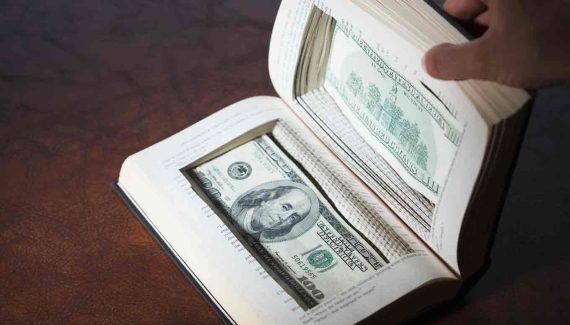Getting a mortgage on a house that you already own outright is not always possible. The lender will ask for proof of your income, which you may not have. However, there are still some options to get the mortgage approval process started. Before getting approved for a mortgage on an existing home, it is important to understand the requirements and restrictions imposed by lenders.
It is also important that you know what kinds of loans are available in your area and their eligibility criteria. This article will help you understand the process of getting a mortgage on an existing home, as well as provide insight into what types of loans are available in your area and how they can be applied to your situation.

Image Credits: housing.com
Contents
Can I Get a Home Equity Loan on a Paid-off House?
The answer to this question is yes. If you own your home outright, you can take out a new loan on the property and remortgage it. When you own your home outright, you can borrow against the value of your home using a variety of mortgage loans. Home equity loans, cash-out refinancing, and home equity lines of credit are all good ways to access your equity at a low-interest rate. But when you apply for a home equity loan on a paid-off house, you must check the same boxes as you would for a traditional mortgage. Lenders will ensure that the value of your home can support the amount you wish to borrow. Lenders will also examine your financial information to ensure you can afford the loan.
How Having a Paid-off House Can Help You to Get a Loan?
Your loan-to-value ratio (LTV), or how much the loan is against your home compared to its current value, plays a significant role in determining whether you qualify for and how much you can borrow. In general, the lower your LTV, the less risky you appear to lenders and the easier it is to get approved. As a result, having your home paid off means that you don’t have an outstanding mortgage balance and that your LTV is most likely zero. This is encouraging for lenders.
Most lenders will lend you 80% to 85% of the value of your home, less any mortgage balances. You can borrow up to 85% of the total value of your home if you have no existing balance. On a $400,000 home, for example, that translates into a lump-sum payment of up to $340,000 ($400,000 x 85%).
If Your House is Paid Off, How Do You Apply for a Home Equity Loan?
If you own your house outright and want a loan, you can get one with a few simple steps.
Locate a lender:
Looking around for lenders is the first step in obtaining a home equity loan, HELOC, or cash-out refinance. To do so, apply with several banks, online lenders, credit unions, and other options to ensure that you will get the best deal.
Apply and provide the necessary documentation:
Various financial documents will be required by your lender to demonstrate your income, debts, and assets. W-2s, 1099s, tax returns, bank statements, and other important documents are generally needed. You must also agree to a credit check, which allows them to assess your payment habits and debt history.
Obtain an evaluation:
Your home will be appraised by the lender to determine its current market value. This is how they will determine your LTV and the amount of equity you have access to.
Complete your loan:
Finally, you’ll go to a closing appointment to pay your closing costs and sign the loan paperwork. If you get a home equity loan or cash-out refinance, the lump-sum payment will usually appear in your bank account within a few days. You should get a debit card and a checkbook to access your credit line with a HELOC.
Must Read: How to Get a Mortgage With Bad Credit but Good Income
Other Options for Borrowing Against Your Home
A home equity loan is one option if you own your home outright and require a loan. But a home equity loan on a paid-off house isn’t the only way to access your home equity. A home equity line of credit (HELOC), reverse mortgage, and a cash-out refinance are other options which you may consider.
Home equity line of credit (HELOC):
Another option for borrowing against a home is a home equity line of credit (HELOC). A HELOC works similarly to a home equity loan, with a few exceptions. Instead of receiving the loan proceeds in one lump sum, you will be given a line of credit to use as needed, much like a credit card. You will be able to draw on the line of credit during the draw period and repay it during the repayment period. Furthermore, HELOCs are riskier than home equity loans because their interest rates are typically variable. However, because you’re using a paid-off house as collateral, they have lower interest rates than home equity loans, personal loans, and credit cards.
Reverse mortgage:
A home equity conversion mortgage (HECM), the most common type of reverse mortgage, allows homeowners of 62 years old and older to take out a mortgage on a paid-for home. Instead of making mortgage payments and lowering your loan balance, your lender pays you on a reverse mortgage, and your loan balance grows over time. Borrowers can receive reverse mortgage proceeds in the form of a lump sum, a line of credit, or monthly payments. These options allow homeowners to use the loan however they see fit, such as supplementing their income, making home improvements, or funding large purchases. Keep in mind that a reverse mortgage will eat away at your home equity over time. And the loan becomes due when you sell the house or move out.
Cash-out refinances:
A cash-out refinance is another way to tap into the equity in your home. Typically, a cash-out refinance would be used to replace an existing mortgage with a higher-balance mortgage and then pocket the difference at closing. Even if you don’t have a current mortgage, you can still do a cash-out refinance, which may result in a lower interest rate than other financing options. The downside is that closing costs on cash-out refinances are typically high; so make sure you have enough cash on hand to cover these. The average refinances closing costs around $5,000, according to Freddie Mac.
You May Like: Buy a Fixer-Upper House With No Money
Things to Know Before Using a Paid-off House as Collateral
When you borrow against a paid-off house, you introduce a financial risk that did not previously exist. Regardless of the loan product, you select, you will put your home at risk of foreclosure if you are somehow unable to make the payments. Consider the following factors before taking out a mortgage on a property you own to understand whether the benefits outweigh the risks:
Look around:
Prices can vary greatly. Contact a number of creditors, such as banks, credit unions, savings and loans, and mortgage companies. Inquire with each creditor about the best loan you might be eligible for.
Take a look at the Annual Percentage Rate:
While looking for a loan, the APR is the most important factor to consider. It considers not only the interest rate(s), but also points (each point is a fee equal to one percent of the loan amount), mortgage broker fees, and certain other credit charges you must pay the creditor, expressed as a yearly rate. In general, the lower the APR, the lower the cost of your loan. Inquire whether the APR is fixed or adjustable — that is, will it change? If so, how often and how extensively?
Know the term of the loan:
How long will you pay back the loan? If you obtain a home equity loan to consolidate credit card debt and other short-term loans, you may be required to make payments on those other debts for an extended period of time.
How long will it take to repay the new loan?:
Consider the loan’s term length and whether it makes sense to be in debt for that long, especially if you’ve already paid off your home after several years of mortgage payments.
The monthly installment:
What is the grand total? Will it stay the same or will it evolve? Inquire whether your monthly payment includes escrows for taxes and insurance. Otherwise, you’ll have to pay for those items separately.
Whether or not you can make the payment:
Before using a paid-off house as collateral, ensure that the new payment fits within your budget and overall financial goals. Will your savings be harmed? Will other financial objectives have to take a back seat? Before introducing a new payment method, consider the answers to these questions.
Prepayment penalties:
These are additional fees that may be applied if you pay off your loan early through refinancing or selling your home. These fees may compel you to keep a high-interest loan by making it prohibitively expensive to refinance. Determine the amount of the prepayment penalty on your loan. Inquire with the creditor about getting a loan without a prepayment penalty and how much it would cost. That is why you should understand and take decisions regarding what is best for you.
Whether other options are better suited to you:
Consider all of your options before taking out a mortgage on a property you own. Is it better to wait and save up for the purchase you want to make? Or are there other borrowing options that don’t put your home in jeopardy?
Pros and Cons of Taking a Home Equity Loan
Before you begin filling out loan paperwork, consider the following pros and cons.
Pros:
You will be charged a fixed interest rate: The interest rate you sign up for is the interest rate you will pay for the duration of the loan. Even if the Federal Reserve raises interest rates, they will not rise.
Your borrowing costs will be lowered: When compared to other types of loans, using real estate as collateral typically results in lower interest rates.
Your payments will remain unchanged: As you are borrowing in one lump sum amount with a fixed interest rate, your payments are predictable and will not fluctuate over the life of the loan.
You can put the money to use for almost anything: There are no restrictions on how you can use the money from a home equity loan.
You may be able to deduct your interest payments: You may be able to deduct the interest on your home equity loan if you use the proceeds to improve your home.
Cons:
You may have to pay higher interest rates than you would for a HELOC: Unlike a home equity line of credit (HELOC), the interest rate on a home equity loan does not fluctuate with the market, the rate on a home equity loan is usually higher.
The Possibility of Losing Your Home: A home equity loan uses your house as collateral. As a result, if you default on your loan or miss payments, you may lose your home to foreclosure. This is probably the most significant disadvantage of taking out a home equity loan, so you should make sure that you can make the payments before signing the loan documents.
Closing costs are your responsibility: Closing costs will almost certainly be required, as with most real estate loans. These fees can range between 2% and 5% of the loan amount.
There will be two mortgage payments: If you still have a primary mortgage, now you will have two mortgage payments, which will reduce your disposable income and tighten your monthly.
Requirements for credit and equity: While home equity loans generally have lower interest rates than unsecured loans or credit cards, the best rates are given to borrowers with good to excellent credit. Similarly, having between 15% and 20% equity in your home is usually required to qualify for a home equity loan.
Conclusion
People who have a house outright and want to get a loan often find themselves in a difficult position. They are not able to get the loan because they don’t have collateral, they can’t get the loan at all because they don’t have a credit history, or they can’t get the loan with a good interest rate.
Home equity loans have long been used by borrowers to obtain large sums of cash at low-interest rates. Even as interest rates rise, home equity loans remain a less expensive option than other types of debt because they carry the risk of losing your home if you fail to make payments. Make certain that the purpose of the home equity loan is worth the risk.
Before applying for home quietly loans, ask for an explanation of any amount, term, or condition that you don’t understand while signing anything. Inquire whether any of the loan terms promised to you prior to closing have changed. If the terms differ from what you expected, do not sign the loan agreement. A creditor, for example, should not promise a specific APR and then raise it without justification at closing. Negotiate for what you were promised if the terms differ. If you can’t get it, you should be prepared to walk away and take your business elsewhere. Before you leave the creditor, obtain a copy of the documents you signed. They contain vital information regarding your rights and obligations.
Post You May Like:
- How to Start a Neo Bank and Succeed
- Eligible for a Second Chance on Your Car Loan?
- Is Red Arrow Loans Legit?


